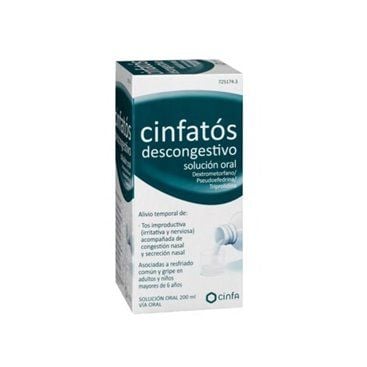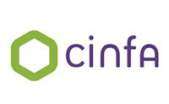Cinfatos Decongestant Oral Solution 200Ml (Pet)
Cinfatos Decongestive Oral Solution is indicated for the temporary relief of unproductive cough (irritative cough, nervous cough) accompanied by nasal congestion and runny nose, associated with the common cold and flu in adults and children over 6 years of age.
Cinfatos Decongestive Oral Solution is indicated for the temporary relief of unproductive cough (irritative cough, nervous cough) accompanied by nasal congestion and runny nose, associated with the common cold and flu in adults and children over 6 years of age.
Decongestant Cinfatos (Oral Solution 200Ml (Pet))
dextromethorphan hydrobromide, pseudoephedrine hydrochloride, triprolidine hydrochloride
ACTION AND MECHANISM
- Combination of a central [ANTITUSSIVE], a [NASO/PHARYNGEAL DECONGESTANT] and an agent [HISTAMINERGIC ANTAGONIST (H-1)], which can eliminate cough, nasal congestion and runny nose associated with catarrhal processes.
INDICATIONS
- Symptomatic relief of [DRY COUGH] (irritative cough, nervous cough) accompanied by [RHINORHEA] and [NASAL CONGESION] associated with [COMMON COLD] and [FLU] in adults and children from 6 years of age.
POSOLOGY
DECONGESTANT CINFATOS:
- Adults: 10 ml/6-8 h.
- Children and adolescents < 18 years:
* Adolescents > 12 years: 10 ml/6-8 h.
* Children between 6-12 years: 5 ml/6-8 h.
* Children between 2-5 years: only under medical supervision, due to the risk of paradoxical effects of CNS stimulation; 2.5ml/6-8h.
* Children < 2 years: Safety and efficacy have not been evaluated, so its use is not recommended.
- Elderly: use adult dosage, but taking into account that a dose adjustment may be necessary, since this population is especially sensitive to the adverse effects of pseudoephedrine.
Do not exceed 4 doses in 24 hours.
Duration of treatment: If symptoms worsen, persist for more than 5 days, or are accompanied by high fever, skin rash, or persistent headache, the clinical situation should be evaluated.
DOSAGE IN RENAL FAILURE
- Moderate or severe: a dose adjustment may be necessary, although no specific studies have been performed.
DOSAGE IN LIVER FAILURE
A dose adjustment may be necessary, since the metabolism of dextromethorphan may be altered.
RULES FOR CORRECT ADMINISTRATION
Measure the amount of the medicine with the measuring cup that is included in the package. It is recommended to drink a copious amount of water during treatment.
If the drug is administered at night it should be taken a few hours before bedtime to minimize the possibility of insomnia, especially in patients with difficulty sleeping.
Administration with food : it is recommended to take this medication with meals. Intake with food or drink does not affect its effectiveness. Do not take together with grapefruit or bitter orange juice because they can increase the adverse effects.
Alcoholic beverages should not be consumed during treatment as it may cause adverse effects.
Limit the consumption of drinks that contain caffeine (coffee, tea, chocolate and cola drinks).
CONTRAINDICATIONS
- Hypersensitivity to dextromethorphan, pseudoephedrine or triprolidine, or [ALLERGY TO OPIOIDS] or sympathomimetics.
- [PORFYRIA]. H1-antihistamines are not considered safe in these patients.
- Patients treated with MAOI-type antidepressants in the 14 days before starting therapy with pseudoephedrine.
- Treatments with MAOIs in the 14 days before starting therapy or concomitantly. Because it contains pseudoephedrine, it could cause an increase in blood pressure; because it contains dextromethorphan, a serotonin syndrome could be triggered (see Interactions).
- [PRODUCTIVE COUGH], persistent cough, or cough associated with smoking, [PULMONARY EMPHYSEMA], [ASTHMA]. Inhibition of the cough reflex could cause pulmonary obstruction.
- [RESPIRATORY INSUFFICIENCY].
- [ULCEROUS COLITIS].
- [GLAUCOMA]
- Serious cardiovascular disease (hypertension, coronary or arterial disease) (see PRECAUTIONS).
- [HYPERTHYROIDISM]
PRECAUTIONS
- [KIDNEY FAILURE], [HEPATIC FAILURE]. An accumulation of the active ingredients of the medicine could occur.
- Patients with [DIABETES], [CORONARY FAILURE], [ISCHEMIC HEART DISEASE], [ARTERIAL HYPERTENSION], [CARDIAC ARRHYTHMIA], [PHEOCROMOCYTOMA], [PROSTATIC HYPERPLASIA] or [URINARY BLADDER OBSTRUCTION], [MIASTHENIA GRAVIS], [ PEPTIC ULCERA] stenosing or [INTESTINAL OBSTRUCTION], predisposition to glaucoma. Both pseudoephedrine and triprolidine could aggravate symptoms. In severe cases, it may be advisable to avoid administration.
- [EPILEPSY]. H1-antihistamines have occasionally been associated with paradoxical hyperexcitability reactions, and therefore could lower the seizure threshold.
- Patients who present [SEDATION], [ASTENIA], or who are bedridden.
- [ATOPIC DERMATITIS]. The administration of dextromethorphan may be associated with the release of histamine, so it should be avoided in these patients.
- Surgical intervention. It is recommended to stop treatment at least 24 hours before surgery.
- Abuse. There have been reports of abuse with dextromethorphan, particularly by adolescents. Therefore, this possibility should be taken into account as it can cause serious adverse effects.
- Unit. Dextromethorphan has occasionally given rise to dependency pictures, so it is recommended to monitor the patient.
PRECAUTIONS RELATED TO EXCIPIENTS
- This medication contains sodium salts, which should be taken into account in patients with low-sodium diets.
- This medicine contains sorbitol. Patients with hereditary [FRUCTOSE INTOLERANCE] should not take this medicine.
ADVICE TO THE PATIENT
- It is recommended not to exceed the recommended daily doses.
- It can cause drowsiness, so caution is recommended when driving, and do not combine it with drugs or other sedative substances such as alcohol.
- The doctor or pharmacist should be notified if the patient has diabetes, heart disease, hypertension or glaucoma, as well as if he is being treated with any other drug.
- The doctor should be notified if the patient is being treated with antidepressants.
- The doctor should be notified of any change in the patient's behavior or mood.
- Treatment should be discontinued and a doctor seen if nervousness, intense headache, dizziness or insomnia appear, if the symptoms persist for more than seven days or if a high fever appears.
- It is advisable to drink plenty of water during treatment.
- It should not be administered together with other medicines that contain nasal decongestants.
SPECIAL WARNINGS
- It is recommended to monitor the patient in case signs of abuse appear.
- The association with MAOIs should be avoided, leaving at least 14 days of rest between the administration of both drugs.
- It is recommended to periodically monitor blood pressure in hypertensive patients.
INTERACTIONS
- Alcohol. It can potentiate the appearance of side effects.
- Antiarrhythmics. Some antiarrhythmics could increase the toxicity of dextromethorphan by inhibiting metabolism.
- Anticholinergics (antiparkinsonians, tricyclic antidepressants, MAOIs, neuroleptics). These drugs could potentiate the anticholinergic effects of triprolidine.
- Tricyclic antidepressants. Potentiation of cardiac stimulant effects could occur, with hypertension and tachycardia.
- Antihypertensives (beta-blockers, diuretics, guanethidine). Pseudoephedrine could antagonize the antihypertensive effects, and even lead to hypertensive crises when combined with beta-blockers. It is recommended to monitor blood pressure.
- Digital. The risk of cardiac arrhythmias could be increased.
- Nerve stimulants (amphetamines, cocaine, xanthines). Nerve stimulation could be enhanced, leading to intense excitability.
- Expectorants and mucolytics. Pulmonary obstruction could result from inhibition of the cough reflex.
- Thyroid hormones. Potentiation of cardiac stimulant effects could occur, with hypertension and tachycardia.
- MAOI. MAOIs could cause serious and potentially fatal conditions when combined with pseudoephedrine (hypertensive crisis) or dextromethorphan (excitement, hypertension). It is recommended not to administer products with pseudoephedrine or dextromethorphan until at least 14 days after treatment with the antidepressant.
- SSRIs (fluoxetine, paroxetine). The toxicity of dextromethorphan may be increased due to the inhibition of its metabolism by these drugs.
- Methyldopa. Hypertensive crises could occur after co-administration with pseudoephedrine.
- Nitrates. Pseudoephedrine could antagonize the antianginal effects of nitrates.
- Sedatives (opioid analgesics, barbiturates, benzodiazepines, antipsychotics). The co-administration of antihistamines together with a sedative drug could potentiate the hypnotic action. It is recommended to extreme precautions.
- Sympathomimetics. Potentiation of side effects may occur.
PREGNANCY
Adequate and well-controlled studies in humans have not been carried out, so the use of this drug is only accepted in the absence of safer therapeutic alternatives.
LACTATION
Pseudoephedrine is excreted in breast milk, but it is not known whether dextromethorphan and triprolidine do. Infants may be especially sensitive to the adverse effects of these drugs, so it is recommended to stop breastfeeding or avoid the administration of this drug.
CHILDREN
It can be used in children or adolescents from 6 to 12 years of age, with the corresponding dosage adjustment.
Do not administer to children under 6 years of age. It is contraindicated.
EFFECTS ON DRIVING
This medicine may cause light sedation in certain patients, substantially affecting the ability to drive and/or operate machinery. Patients should avoid operating dangerous machinery, including automobiles, until they are reasonably certain that drug treatment will not adversely affect them.
ADVERSE REACTIONS
The components of this medicine do not usually give rise to significant adverse reactions. The following have been described:
- Digestive. [NAUSEA], [VOMITING], [CONSTIPATION], [DIARRHEA], [EPIGASTRIC PAIN], [ANOREXIA], [DRY MOUTH].
- Neurological/psychological. [NERVOUSNESS], [DIZZNESS], [VERTIGO], [EXCITABILITY], [INSOMNIA], [HEADACHE], [SLEEPISHNESS].
- Cardiovascular. [CARDIAC ARRYTHMIA], with [TACHYCARDIA] and [PALPITATIONS], especially at high doses or in predisposed patients. [ARTERIAL HYPERTENSION] can also occur.
- Genitourinary. [URINARY RETENTION].
- Allergic/dermatological. Cases of [HYPERSENSITIVITY REACTIONS] have been described, with [URTICARIA] and [EXANTEMATIC ERUPTIONS].
OVERDOSE
Symptoms: Overdose may occasionally lead to non-specific gastrointestinal symptoms such as nausea and vomiting. Cardiac arrhythmias, arterial hypertension and symptoms of excitability may also appear, with irritability, insomnia and nervousness. In children, cases of hallucinations have been described.
Treatment: It is recommended to establish the usual detoxification measures, with forced emesis, gastric lavage and administration of activated carbon, if a few hours have elapsed since the overdose. Elimination by forced diuresis can be favored, acidifying the urine, although it is not recommended in severe cases.
The patient will then be monitored and symptomatic treatment will be instituted. In the event of seizures, benzodiazepines may be administered intravenously or rectally, depending on age. If respiratory depression occurs, naloxone should be administered.
If necessary, assisted breathing will be instituted.
DOPING
Pseudoephedrine is a prohibited substance during competition.
It is prohibited when its administration gives rise to a concentration in urine greater than 150 mcg/ml.
Detection in a sample during competition of any amount of pseudoephedrine in combination with a diuretic or masking agent will be considered an adverse analytical finding, unless the athlete has obtained an approved therapeutic use authorization (TUE) for ephedrine, in addition than that granted for the diuretic or masking agent.
It is considered a “Specified Substance” and, therefore, a rule violation involving this substance may result in a sanction reduction as long as the Athlete can demonstrate that the use of the Specified Substance in question was not with the intent to increase your athletic performance.



